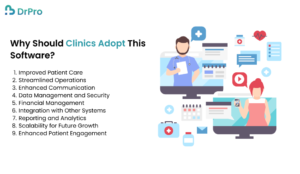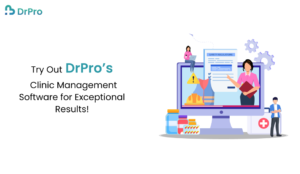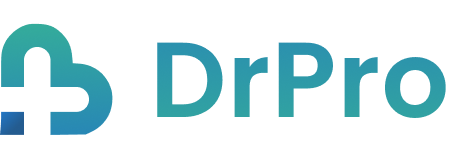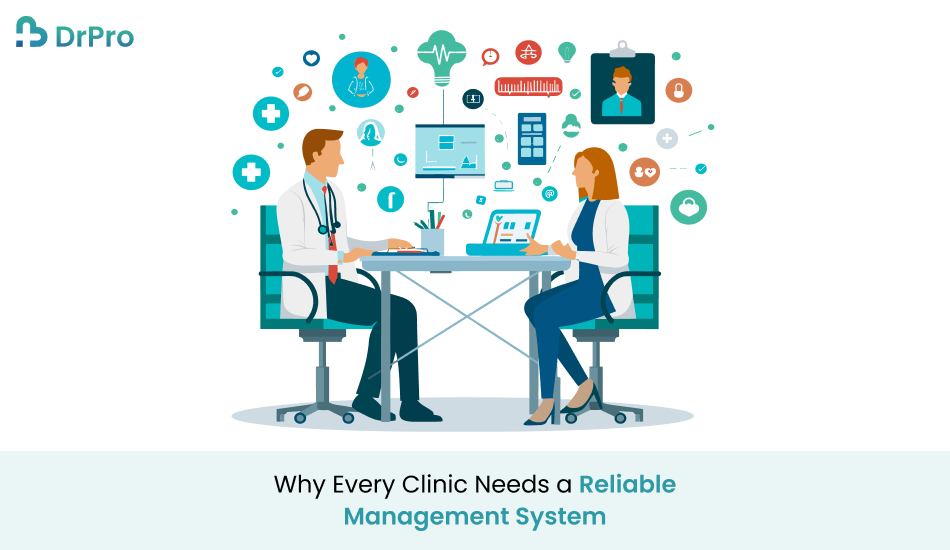Quick Summary
As in any contemporary organization, clinics are experiencing a shift towards increased productivity and focus on customer needs. These issues are well handled by a reliable management system. This paper looks at the advantages of clinic management software, how clinic management software helps in the improvement of clinic operations and clinic management, and Why clinics need management software should incorporate this technology for better clinical practice.
Introduction
On average, we were able to establish that the healthcare industry is changing dynamically owing to technology and patient demands. When so closely intertwined into the fabric of the healthcare system and being such important elements, clinics have to be prepared for these changes so they can function properly as care providers. A reliable clinic management system (CMS) is not a luxury but a necessity in the day–to–day running of any facility. As we know, health care delivery involves both clinical and administrative aspects – this software helps clinics to run well.
In this article we are going to learn what clinic management software is, Why clinics need management software should implement it, and what it has to offer. Realizing the significance of an effective system in managing institutions that deal with patients, clinic designers can therefore make appropriate decisions that will improve the delivery of health care services as well as Clinic function appropriately.
What is a Clinic Management Software?
Clinic management software is an all-in-one application that healthcare facilities use to help them run different parts of their businesses. I pointed here on the appointment calendar, patients’ record database, invoice, and patient notification system.
A reliable CMS typically includes the following features:
Appointment Scheduling:
It may be used to book appointments by the patients and the schedules can be well handled by the staff.
Patient Records Management:
This department holds individual patient records regarding medical history, therapy, and accounts.
Billing and Invoicing:
Reduces billing cycle time, and avoids manual errors in billing and the consequent delay in receivables.
Reporting and Analytics:
Offers analytical information about the clinic outcome to the particular clinics to inform the clinic’s decisions.
Essentially, clinic management software makes it easy for clinics to perform all the tasks this article describes since they are seamlessly integrated into one platform.
Why Should Clinics Adopt This Software?

There are many advantages associated with selecting a sound clinic management system since it holds a lot of potential for improving not only the quality of work with patients but with organizational processes as well. Below are some compelling reasons for clinics to invest in this technology:
1. Improved Patient Care
A reliable CMS is fundamental and occupation important for improving healthcare quality. In this case, patient information is well coordinated so healthcare providers can easily determine the patient’s medical records and treatment history. This access empowers stakeholders to make appropriate decisions towards a better quality of their health.
A study conducted by the National Center for Biotechnology Information (NCBI) shows that the efficient management of patient data decreases cases of medical mistakes and enhances decision-making.
2. Streamlined Operations
Practicing in a clinic exposes one to countless responsibilities that may be tiresome. Clinic management software is a program that helps in day-to-day activities, and well-coordinated operations such as booking appointments, accounts receivables, and patient information management. Such automation results in relief to the staff from the congestion of routine work to enable them to attend to more of the patients.
HIMSS, the Healthcare Information and Management Systems Society, found that clinics that used management systems cut administrative expenses by up to 30% leaving much more time for patients.
3. Enhanced Communication
Communication plays a central role, especially in any healthcare facility. A good CMS enhances communication with the staff and the patient through notification aspects such as reminders. Many patients get a reminder when they have an appointment scheduled and with such, many staff can work as a team effectively without misunderstanding.
A survey done by The Joint Commission established that clarity makes up the aspect of patient satisfaction scores, indicating that there is a need to have good communication tools in clinics.
4. Data Management and Security
As the laws governing patient data continue to tighten clinics require data security. A good clinic management system entails proper storage and retrieval of patient information to ensure that clinics achieve full compliance with rules such as HIPAA.
The American Medical Association discovered that clinic(s) adopting management systems with high levels of security report fewer instances of data breaches; both preserving patient data and clinic credibility.
5. Financial Management
Here, a reliable CMS helps simplify billing processes and minimizes invoicing and payment collection mistakes. Automated billing systems reduce the amount of time the staffing takes while doing billing, therefore, rapid revenue cycles.
Regarding this, the American Academy of Family Physicians (AAFP) observed that the result of implementing electronic billing systems was that clinics saw a 20% increase in revenue collected through effective billing practices and improved business on overall collection.
6. Integration with Other Systems
While clinic management software may interconnect with electronic health record (EHR) systems, and laboratory information management systems (LIMS). This integration improves compatibility, which creates easier exchanges of data between the systems.
One study in Health Affairs showed that clinics implementing integrated systems felt that there was better coordination of care and less duplication, all of which are considered to be good for patients in the clinic.
7. Scalability for Future Growth
When clinics expand, they have different requirements. It means that the successful management system of the organization in the health sector can be adjusted to respond to these changes by offering new service lines, admitting more patients into its facilities, or adopting the latest technology.
According to the survey conducted by the Medical Group Management Association (MGMA). It was discovered that clinics that have implemented manageable systems are in a prime position to respond efficiently to changes in healthcare needs hence placing them in a better position to stay relevant.
8. Reporting and Analytics
One major benefit of clinic management systems for patient care using a CMS is the availability of data analytics. Such indicators as the number of made appointments, the patient’s characteristics, and the clinics’ financial performance. To be more precise, this analytical approach helps clinics find out how they can develop and make adequate decisions.
It also reveals that clinics involved in using data analysis tools within their Clinic management systems enhance operational efficiency by 25%, based on the survey conducted by Frost & Sullivan.
9. Enhanced Patient Engagement
A good clinic management system can enhance patient satisfaction since he or she can interact more with the clinic through the clinic’s interface without necessarily contacting the clinic’s staff physically. Overall, the ability of patients to manage their own healthcare actively by going to clinics strengthens the role of patient caregivers.
According to a study carried out in the Journal of Medical Internet Research, patients’ engagement is directly proportional to the level of compliance, improved quality of health, and high levels of satisfied patients.
Try Out DrPro’s Clinic Management Software for Exceptional Results!

If you’re looking for a reliable solution to streamline your clinic operations and enhance patient care, look no further than DrPro’s Clinic Management Software. With features designed to meet the unique needs of healthcare providers, DrPro empowers clinics to achieve exceptional results.
Experience the benefits of improved efficiency, secure data management, and enhanced patient engagement. Don’t miss the opportunity to elevate your clinic’s performance—try DrPro today and see the difference for yourself!
Conclusion
The general objective of the management as concluded implied that clinics need effective management systems in a growing healthcare environment. The potential of increasing the level of patient care, the efficiency of operations, effective communication, data protection, and, importantly, finances, can hardly be dismissed.
Extending resources into clinic management software does improve the clinic‘s operational capabilities but also delivers superior patient results. Essentials in the delivery of health care are shifting and therefore clinics that embrace technology will be capable of managing the health needs of people and able to withstand the market forces.
Together, ProjectTree and DrPro offer a powerful integration that enhances productivity and effectiveness across project management and healthcare sectors.
FAQs
Q1. What features should I look for in clinic management software?
It’s useful for search features like appointment scheduling, patient records tracking, billing and invoicing, reporting and analysis, and data security.
Q2. How does clinic management software improve patient care?
It streamlines the storage of patient data and allows healthcare providers to make the right decision fast reducing incidences of wrong diagnoses and treatment.
Q3. Is it necessary for small clinics to adopt management software?
Yes, all sizes of clinics may find the management systems useful as clinics cannot afford not to have improved and efficient ways of managing patients and operations.
Q4. What is the average cost of clinic management software?
While feature and vendor-specific, it is crucial for clinics to anticipate both setup and subsequent recurrent costs for subscription.
Q5. How long does it take to implement a clinic management system?
It takes some time to implement but usually, it can take several weeks in the extreme to several months depending on the information system involved and the clinic under consideration.


